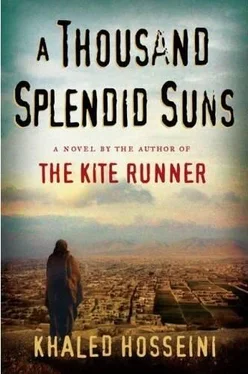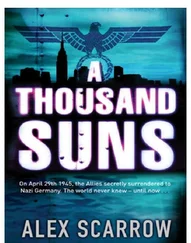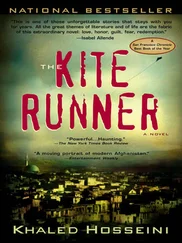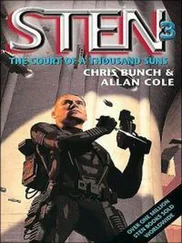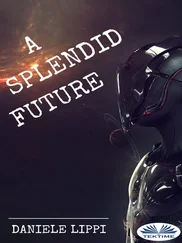Laila asked him which foothills.
"Pir Panjal Pakistan," he said "Where I live is called Murree; it's a summer retreat, an hour from Islamabad. It's hilly and green, lots of trees, high above sea level So it's cool in the summer. Perfect for tourists."
The British had built it as a hill station near their military headquarters in Rawalpindi, he said, for the Victorians to escape the heat. You could still spot a few relics of the colonial times, Tariq said, the occasional tearoom, tin-roofed bungalows, called cottages, that sort of thing. The town itself was small and pleasant. The main street was called the Mall, where there was a post office, a bazaar, a few restaurants, shops that overcharged tourists for painted glass and handknotted carpets. Curiously, the Mall's one-way traffic flowed in one direction one week, the opposite direction the next week.
"The locals say that Ireland's traffic is like that too in places," Tariq said. "I wouldn't know. Anyway, it's nice. It's a plain life, but I like it. I like living there."
"With your goat. With Alyona."
Laila meant this less as a joke than as a surreptitious entry into another line of talk, such as who else was there with him worrying about wolves eating goats. But Tariq only went on nodding.
"I'm sorry about your parents too," he said.
"You heard."
"I spoke to some neighbors earlier," he said. A pause, during which Laila wondered what else the neighbors had told him. "I don't recognize anybody. From the old days, I mean."
"They're all gone. There's no one left you'd know."
"I don't recognize Kabul."
"Neither do I," Laila said. "And I never left."
"MAMMY HAS a new friend," Zalmai said after dinner later that same night, after Tariq had left. "A man."
Rasheed looked up. "Does she, now?"
TARIQ ASKED IF he could smoke.
They had stayed awhile at the Nasir Bagh refugee camp near Peshawar, Tariq said, tapping ash into a saucer. There were sixty thousand Afghans living there already when he and his parents arrived.
"It wasn't as bad as some of the other camps like, God forbid, Jalozai," he said. "I guess at one point it was even some kind of model camp, back during the Cold War, a place the West could point to and prove to the world they weren't just funneling arms into Afghanistan."
But that had been during the Soviet war, Tariq said, the days of jihad and worldwide interest and generous funding and visits from Margaret Thatcher.
"You know the rest, Laila. After the war, the Soviets fell apart, and the West moved on. There was nothing at stake for them in Afghanistan anymore and the money dried up. Now Nasir Bagh is tents, dust, and open sewers. When we got there, they handed us a stick and a sheet of canvas and told us to build ourselves a tent."
Tariq said what he remembered most about Nasir Bagh, where they had stayed for a year, was the color brown. "Brown tents. Brown people. Brown dogs. Brown porridge."
There was a leafless tree he climbed every day, where he straddled a branch and watched the refugees lying about in the sun, their sores and stumps in plain view. He watched little emaciated boys carrying water in their jerry cans, gathering dog droppings to make fire, carving toy AK-47s out of wood with dull knives, lugging the sacks of wheat flour that no one could make bread from that held together. All around the refugee town, the wind made the tents flap. It hurled stubbles of weed everywhere, lifted kites flown from the roofs of mud hovels.
"A lot of kids died. Dysentery, TB, hunger – you name it. Mostly, that damn dysentery. God, Laila. I saw so many kids buried. There's nothing worse a person can see."
He crossed his legs. It grew quiet again between them for a while.
"My father didn't survive that first winter," he said. "He died in his sleep. I don't think there was any pain."
That same winter, he said, his mother caught pneumonia and almost died, would have died, if not for a camp doctor who worked out of a station wagon made into a mobile clinic. She would wake up all night long, feverish, coughing out thick, rust-colored phlegm. The queues were long to see the doctor, Tariq said. Everyone was shivering in line, moaning, coughing, some with shit running down their legs, others too tired or hungry or sick to make words.
"But he was a decent man, the doctor. He treated my mother, gave her some pills, saved her life that winter."
That same winter, Tariq had cornered a kid.
"Twelve, maybe thirteen years old," he said evenly. "I held a shard of glass to his throat and took his blanket from him. I gave it to my mother."
He made a vow to himself, Tariq said, after his mother's illness, that they would not spend another winter in camp. He'd work, save, move them to an apartment in Peshawar with heating and clean water. When spring came, he looked for work. From time to time, a truck came to camp early in the morning and rounded up a couple of dozen boys, took them to a field to move stones or an orchard to pick apples in exchange for a little money, sometimes a blanket, a pair of shoes. But they never wanted him, Tariq said.
"One look at my leg and it was over."
There were other jobs. Ditches to dig, hovels to build, water to carry, feces to shovel from outhouses. But young men fought over these jobs, and Tariq never stood a chance.
Then he met a shopkeeper one day, that fall of 1993.
"He offered me money to take a leather coat to Lahore. Not a lot but enough, enough for one or maybe two months' apartment rent."
The shopkeeper gave him a bus ticket, Tariq said, and the address of a street corner near the Lahore Rail Station where he was to deliver the coat to a friend of the shopkeeper's.
"I knew already. Of course I knew," Tariq said. "He said that if I got caught, I was on my own, that I should remember that he knew where my mother lived. But the money was too good to pass up. And winter was coming again."
"How far did you get?" Laila asked.
"Not far," he said and laughed, sounding apologetic, ashamed. "Never even got on the bus. But I thought I was immune, you know, safe. As though there was some accountant up there somewhere, a guy with a pencil tucked behind his ear who kept track of these things, who tallied things up, and he'd look down and say, 'Yes, yes, he can have this, we'll let it go. He's paid some dues already, this one.'"
It was in the seams, the hashish, and it spilled all over the street when the police took a knife to the coat.
Tariq laughed again when he said this, a climbing, shaky kind of laugh, and Laila remembered how he used to laugh like this when they were little, to cloak embarrassment, to make light of things he'd done that were foolhardy or scandalous.
"HE HAS A LIMP," Zalmai said. "Is this who I think it is?"
"He was only visiting," Mariam said.
"Shut up, you," Rasheed snapped, raising a finger. He turned back to Laila. "Well, what do you know? Laili and Majnoon reunited. Just like old times." His face turned stony. "So you let him in. Here. In my house. You let him in. He was in here with my son."
"You duped me. You lied to me," Laila said, gritting her teeth. "You had that man sit across from me and… You knew I would leave if I thought he was alive."
"AND YOU DIDN'T LIE TO ME?" Rasheed roared. "You think I didn't figure it out? About your harami? You take me for a fool, you whore?"
THE MORE TARIQ TALKED, the more Laila dreaded the moment when he would stop. The silence that would follow, the signal that it was her turn to give account, to provide the why and how and when, to make official what he surely already knew. She felt a faint nausea whenever he paused. She averted his eyes. She looked down at his hands, at the coarse, dark hairs that had sprouted on the back of them in the intervening years.
Читать дальше
